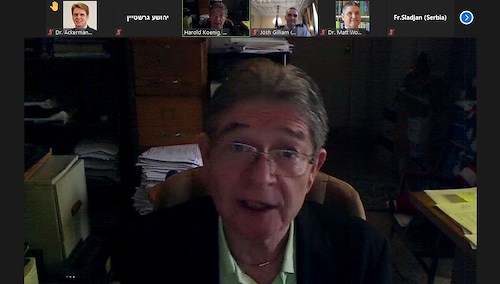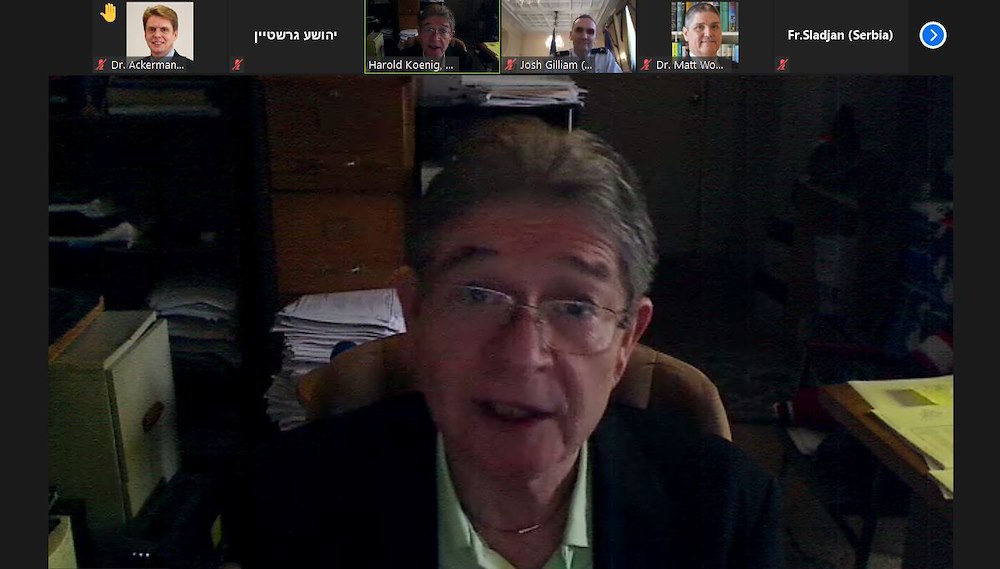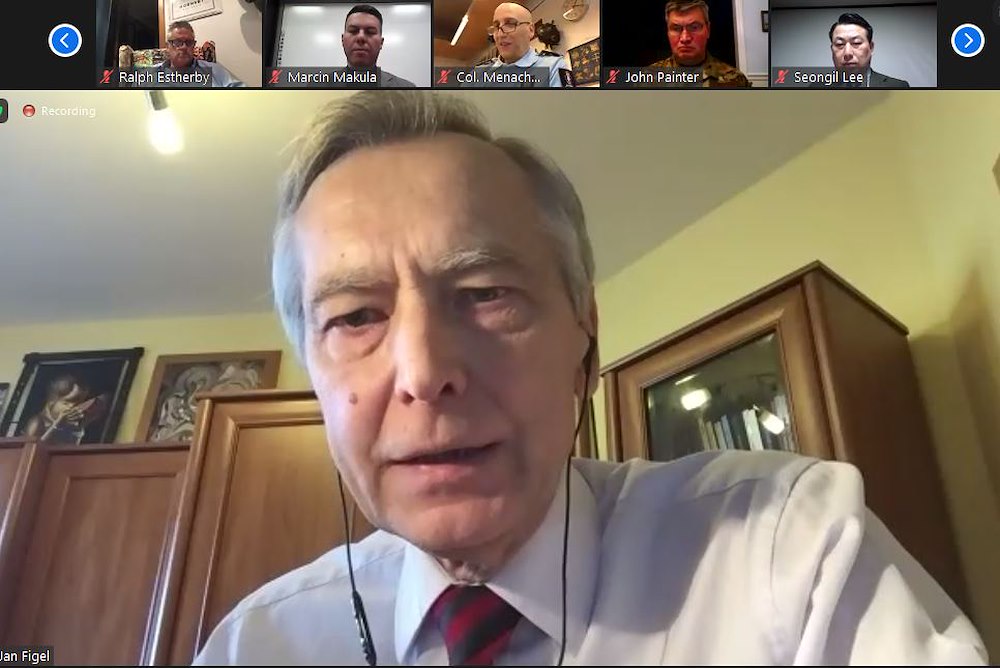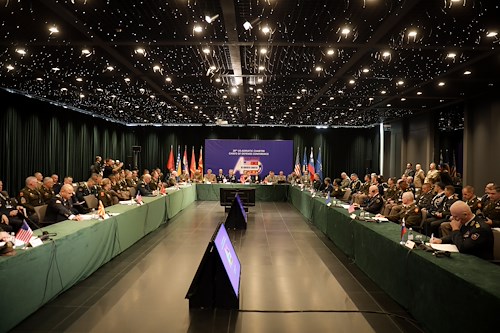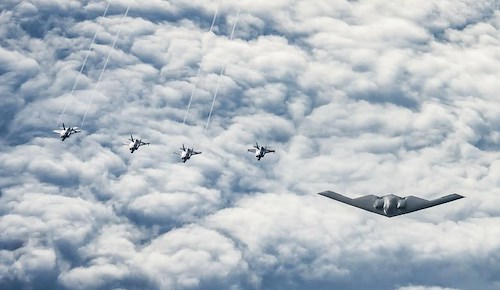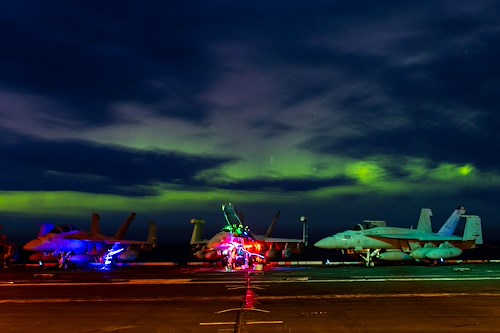Gallery contains 2 images
×
Photo 1 of 2
Chaplain Conference 2
Dr. Harold G. Koenig, MD, a Professor of Psychiatry at Duke University Medical Center, answers questions after his presentation at the 2021 International Military Chief of Chaplains Conference. The 32nd annual conference, was hosted virtually by U.S. European Command on Jan. 26 and 27, 2021, to provide religious leaders from military organizations information about how to conduct ministry activities during a pandemic.
Photo by: U.S. European Command Public Affairs
Photo 2 of 2
Chaplain Conference 1
Ján Figeľ, Former European Commission Special Envoy for the Promotion of Religion or Belief, discusses the importance of protecting religious freedom as part of his presentation at the 2021 International Military Chief of Chaplains Conference. The 32nd annual conference, was hosted virtually by U.S. European Command on Jan. 26 and 27, 2021, to provide religious leaders from military organizations information about how to conduct ministry activities during a pandemic.
Photo by: U.S. European Command Public Affairs
More than 100 military chaplains and religious officials representing 37 nations came together virtually Jan. 26 and 27 to discuss the role religion plays in fostering service members’ resilience as they cope with the COVID-19 pandemic and other stresses.
In his opening remarks at the first day of the International Military Chiefs of Chaplains Conference (IMCCC), U.S. Air Force General Tod D. Wolters, Commander of U.S. European Command (USEUCOM), recognized the importance of the work chaplains perform within military organizations.
“Your efforts in providing our personnel the ability to freely practice their faith are a critical piece to the well-being of individuals and resulting readiness of our nations,” said General Wolters. “The advice and counsel provided by our chaplains is immensely important, perhaps even more so during this past year as our militaries have worked tirelessly to take care of our people and our mission in the midst of a pandemic,” Wolters added.
This year’s IMCCC was the 32nd iteration of the annual event that USEUCOM started in 1990. Over the years, the conference has evolved into an international endeavor that is hosted by a different participating NATO or partner nation each year, with USEUCOM serving as the co-host.
Originally slated to be held in Romania, COVID-19 restrictions required the event to shift to a virtual format, which created the opportunity to also shift the event’s focus to reflect the current times, thus giving the title of the event: Military Chaplain Ministry During a Pandemic.
“The COVID pandemic has brought change to every aspect of our personal and professional lives and the chaplaincy is no exception,” said USEUCOM Chaplain (Air Force Col.) Kleet Barclay during an interview at the conclusion of the first day of the two-day event. “Our team felt it was important to present a conference that provides chaplains with information to help their efforts to establish, re-establish or further professionalize their military chaplaincies during this unprecedented situation,” said Barclay.
Barclay offered that by the very nature of military service, which is inherently stressful, the pandemic “added several more layers of stress on individuals as they try to balance how to keep the mission going while keeping themselves, their comrades and their families healthy in the face of a deadly virus.” He added this is what drove the conference team to seek out presentations from experts who can explain the science behind how religion contributes positively to the overall well-being of the force.
The roster of presenters included scientists from the Yale School of Medicine, Duke University Medical Center, the Harvard School of Public Health and University College London. The titles of the presentations left no doubt about the importance of religious council and well-being with entries such as “Balancing Science and Faith During COVID 19”and “Impact of Stress on Performance, Health, Prevention, and Treatment.”
Dr. Harold G. Koenig, professor of psychiatry at Duke University Medical Center, presented on the positive effect that religious activities have on human immune systems. “People who are religious are healthier. Healthier people are more productive,” Koenig told the group.
Another presenter, Dr. Rajita Sinha, from the Yale School of Medicine, spoke about how religious activities can reduce stress. She offered that religious practices such as prayer or meditation can have a measurable physical impact on the portions of the brain associated with well-being. “A spiritual brain is a calm brain,” Sinha said as she showed photos of brain scans depicting the physical differences between the brain of a person showing signs of stress and that of another person who meditated during the same stressful situation.
In addition to the scientific lectures, chaplaincies from ten nations gave presentations about their challenges and successes ministering during the pandemic.
“Myself and the entire delegation from Israel welcomed the opportunity to meet military chaplains from many other countries and to hear about how they are dealing with the COVID-19 crises,” said Chaplain (Captain) Joshua Gerstein, with IDF Battalion 97 Netzach Yehuda. “We were grateful for the opportunity to present the IDF (Israel Defense Forces) to the forum. The lectures and country presentations were very insightful and I look forward to participating in future conferences,” he added.
Barclay views these peer-to-peer exchanges as a valuable component of the conference. “As allies and partners, we need to understand how our chaplaincy programs are both alike and different. This becomes even more important when our various military organizations must come together for a common mission,” Barclay said.
As an example, he noted that during one of the past conferences he learned that some nations only have chaplains from one faith, or other nations allow chaplains to carry weapons in self-defense. “That kind of information is vital when circumstances bring us all together and we have to figure out a schedule of religious services and how to work inter-operationally. This conference provides the opportunity for us to connect with each other so that we can all better contribute to the overall mission,” Barclay said.
Father Andriy Zelinskyy of the Ukrainian Greek-Catholic Church, and deputy head of the Department of Military Chaplaincy of Ukraine, offered that the conference provided much-needed insight. “This year IMCCC helped us to realize once again that in our world there are still serious challenges that can’t be efficiently dealt with on a national level and require from us a global cooperation and fraternal support. Nowadays, we often tend to neglect this self-evident truth. The pandemic has made us more aware of it: together we are stronger.”
Zelinskyy added that while there is still much more to learn, “the conferences allow chaplains to come together to share our experiences. We need our collective wisdom and creativity to serve with a great degree of efficiency and dedication,” he said.
Barclay shared at the conclusion of the event how pleased he was that so many came together and the robust nature of the discussions and offered that planning was already underway for next year.
-30-
About USEUCOM
U.S. European Command (USEUCOM) is responsible for U.S. military operations across Europe, portions of Asia and the Middle East, the Arctic and Atlantic Ocean. USEUCOM is comprised of more than 64,000 military and civilian personnel and works closely with NATO Allies and partners. The command is one of two U.S. forward-deployed geographic combatant commands headquartered in Stuttgart, Germany.

